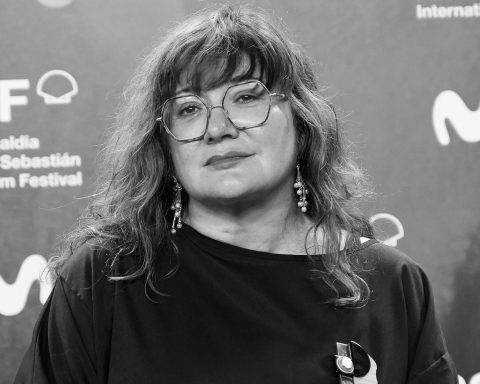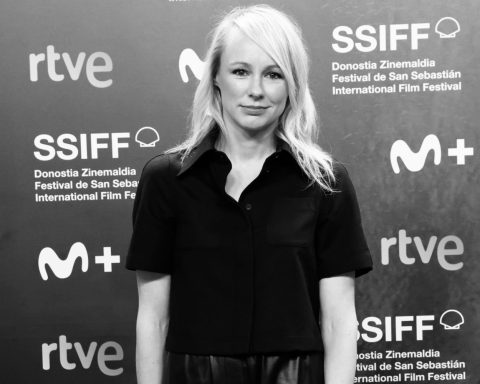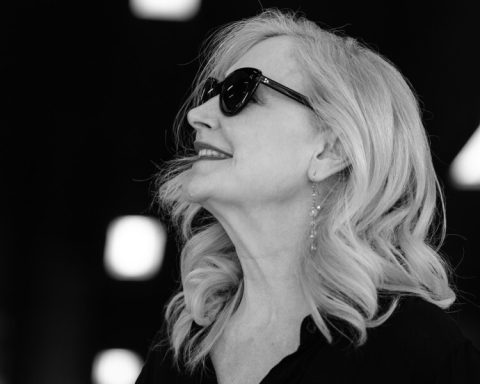Idolized not only by the next generation of talents in today’s Cinema such as Alice Diop, Mati Diop or Charlotte Wells and almost every other film buff out there, but also by her peers in the likes of Pedro Almodóvar or Andrea Arnold among others, veteran French auteur Claire Denis is considered one of the great voices of today’s cinema. At the heart of her work is a fascination with the pleasures and adversities of belonging and otherness and the weight and gift of forgiveness. Her films deal with themes of colonization and post-colonial West Africa as well as issues in modern France, and influence the singularity of European Cinema. In her films, Denis also explores obsession, desire, violence, sex, body and firmly believes evil often resides within us. Her feature film Beau Travail is deemed one of the greatest films of the 1990s and of all time. Denis, whose other acclaimed works include Chocolat (1988), Trouble Every Day (2001), 35 Shots of Rum (2008), White Material (2009), High Life (2018), Both Sides of the Blade (2022 – Silver Bear for Best Director at the Berlinale) and Stars at Noon (2022 – Grand Prix at Cannes) has served as President of the Jury at the 71st San Sebastian International Film Festival.
Denis, who has had a long relationship with film festivals over the course of her long and prolific career, having been a member of multiple film festival boards, among which the Venice Film Festival in 2005, the presidency of the board of Cinéfondation and short films at the Cannes Film Festival in 2019 and of the Orizzonti section at the Venice Film Festival in 2020, is therefore no stranger to being on the other side of the festival ecosystem. Indeed, Denis says she approaches this particular stint as a spectator – nothing more, nothing less, “Watching films is the reason why I’m here since that’s why I wanted to make films, actually. So, I don’t feel I’m on the other side. I feel I’m in a family of Cinema, actually. I feel good. And I try to be the best I can; not to be too narrow-minded, to be open, and to share with the other members of the jury as much as we can to fit together.”
Denis has an ambiguous relationship with awards. She deeply enjoys giving awards, but receiving them is an entirely different matter, “Each time I give an award, I give it completely, honestly moved at that moment. To receive an award, it’s trickier. It’s moving. It’s a little bit frightening, too, because it’s like, ‘Oh, you should be happy,’ and it’s not completely true. Receiving an award, it’s also questioning myself, so I’m not sure it’s the same at all,” she shares.
Having grown up in countries where there were no cinemas, Denis fondly remembers discovering movie-going with her grandparents. As a teenager, she describes the experience as nothing short of a miracle, “There was nothing better for me when I was growing up. I was also lucky that my mother was also a Cinema addict, and she would never stop me from going even if she thought I was a little bit too young for certain types of film,” Denis recalls.
And yet, it was not a “normal” wish for her to become a filmmaker, “I was afraid even to say the words, ‘I want to make films,’” she admits. But she ended up fulfilling her dream and going to film school after marrying young. She wanted to test herself and discovered that saying she wanted to make films was no longer a frightening thought, “I realized I could, which, in my mind, was not meaning I would, but just to say ‘I wish’ was already the first step,” she remembers. But filmmaking is a strange thing, according to her, “Making a film is hard and painful. It’s never easy. And this effort is also part of a certain type of addiction. As if knowing that a film does not exist with a script with a scenario.” For her, a film exists really when she is in the editing room with her editor, “But this feeling is a sort of strange road full of anxiety and happiness. And trust, connection, surprise… And this is maybe the complexity that makes the filmmaker ready to go for another,” she explains.
In that sense, Denis sees filmmaking as a collaborative operation. She trusts the filmmaking process, “I think whatever you do, there is no other way than trusting. There is a thing today when you are making sex scenes in a film, you have a coach to help actors and I never needed that, not because I’m clever in sex scenes, but because I would never ask an actress or an actor to do something that [they are uncomfortable with]. I have to be with them at that moment. I’m shy, too. If I don’t share that moment with them, then I feel really guilty. So, I think I want to be shy with them and I want to be afraid with the cameraman or woman or anxious with the light, or anxious because rain is coming at the wrong moment, anxious because I’m behind in the schedule. Anxious about everything, but together it’s very different. Alone, it’s a different type of anxiety,” she says.
On set, Denis is known to give freedom to her actors, “It’s a pleasure to give freedom to an actor or actress you’ve chosen. I mean, there is nothing more exciting that to let it go,” she claims.
For her, the chief difference between filmmaking today and at the onset of her career was the ushering of the digital era. She feels the moviemaking climate is strange today, perhaps due to the easy access provided by the plethora of streaming platforms or the exorbitant sums of money spent on postproduction, “I remember hearing that with digital it would be so easy to make film. In fact, I think it it’s not really that easy. My feeling is that it seems easy, but it’s not. The film needs a point of view, whether it’s digital or on film… Less money is spent during shooting and much more is spent on postproduction, effects, sound, image coloring and, sometimes, I have the feeling that when I see a film, it is wearing too much makeup,” she laments.
Denis admits she has “never been not anxious.” When she is preparing a shot, she can immediately feel the anxiety mounting in her actors. But she has to provide them with comfort, trust and security. She never watches the shots on the screen, but prefers to remain near the camera, which is why she can always hear her cinematographers Agnès Godard and Éric Gautier’s hearts beating, “I know when [Agnès] is happy during a shot, and I know when she’s not happy. So, I can guess it’s maybe out of focus or maybe she missed something. So, I feel that. And with Éric, we made two films together, and I realized that although his anxiety is completely different – very different from Agnès’ – I could feel his energy when we were together. This is very important,” she shares.
A pioneer in portraying diversity onscreen, Denis says it stems from her childhood travels with her parents and siblings, “I’ve been lucky for that. I had the impression that I had a better vision of the world. I was not a better person, of course, but my vision was wider and I thought if I do not express that on film, then it means nothing.” She sees the world’s diversity when she takes the subway in Paris and believes that not solving the European immigration issue is problematic, “I think to live together, to share without fear is very important. And today, I think there are a lot of fear that is obscene, like the fear of welcoming poor people, the fear of welcoming other cultures. I think it probably did exist in my childhood, of course; racism was not born yesterday,” she remarks. She had hoped that the turn of the century would be a more fearless and welcoming time, but alas, she was mistaken, “When I see all those right-wing governments popping here and there more and more, for me, it’s like my chest is narrowing and sometimes my breathing is a little bit in bad shape,” she deplores.
However, traveling the world did not shape her as filmmaker. Movies did, “By watching movies, you start to realize the secret of something like a relation with someone, desire or fear – all those emotional scenes of real life. It’s something that a good film brings you, makes you aware of in such a delicate or brutal way,” she explicates. Movies prepared her for life. They also introduced her to queerness. She recalls seeing Joseph L. Mankiewicz’s Suddenly, Last Summer at fifteen in a Paris cinema with a friend without having read Tennessee Williams’ novel previously and she understood the film in her own way, but was overwhelmed with uncertainty, “I remember all those hours I spent in my bed feeling this mysterious thing that the human being carry in itself, but then after when I read Tennessee Williams or William Faulkner ans also French writers, I realize that in France, there is a more logical approach to emotions. [The way] those writers from Southern States describe those secret emotion of youth was a sort of education,” she recalls.
Denis doesn’t remember the first film she saw, but she does remember however how, when she was eight or nine years old, the U.S. Government would send its war films to Africa and how she saw thirty films about the war between the United States and Japan, “I knew everything about Pearl Harbor and the way the Japanese pilot were in the planes. It was crazy!” she recounts. It was only when she returned to France that her true Cinema education began, “I remember one of my grand-fathers took me to see War and Peace with Audrey Hepburn and Omar Sharif. I was amazed! It was on a huge screen and then maybe Quo Vadis? My Brazilian grand-father, he liked Cinema and he was convinced you didn’t have to show only film for children. I remember a friend of my father’s taking me to see Pather Patchali in a cineclub and I always remember this film. I was the same age as the little boy,” she reminisces.
Denis didn’t know she is a trailblazer for the new generations of female filmmakers, “I was not aware of that thank God! It’s true! Had I been aware of that, I would have hung myself!” she proclaims. When she started out, she confesses there was a naivete, an insouciance of sorts, “I never felt that I was starting a career. Maybe it’s the first and the last [film]. This is a second! Wow! Maybe, it’s the last! I never said the career thing. Never. It’s a strange feeling.” But she is happy she can call some of them friends like for instance Mati Diop and Alice Diop, “Both those two young women inspire me very much. They give me their trust and they give me a sort of strength in a way by trusting me. Not only women, but also young male directors. But the connection with Mati and Alice was made before they [had made their films]. Alice asked me to watch her short movies and Matthew was acting in one of my movies, so it’s like a family connection,” she concludes.
Photo credits: © Festival de San Sebastián. Photo: Jorge Fuembuena.
This interview was conducted at the 2023 San Sebastian International Film Festival.









